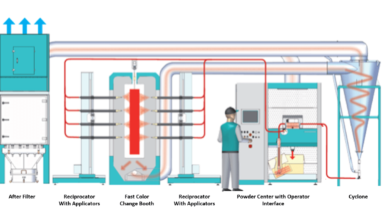Why Is Energy Management Important?

Welcome to the world of Energy Management – where efficiency meets sustainability, and savings go hand in hand with environmental stewardship. In today’s fast-paced world, the importance of managing energy resources wisely cannot be overstated. From reducing carbon footprints to cutting costs, effective energy management plays a crucial role in shaping a brighter future for our planet and our wallets. Let’s dive into why mastering the art of energy management is not just a trend but a necessity in today’s dynamic landscape.
What is Energy Management?
Energy management is the strategic process of monitoring, controlling, and conserving energy in a building or organization. It involves analyzing energy usage patterns, identifying areas for improvement, and implementing solutions to optimize efficiency. By actively managing energy consumption, businesses can reduce costs, minimize waste, and lessen their environmental impact.
One key aspect of energy management is setting specific goals and targets for reducing energy consumption. This could involve implementing energy-efficient technologies like LED lighting or upgrading HVAC systems to improve performance. Additionally, raising awareness among employees about the importance of saving energy can also play a significant role in achieving conservation objectives.
Monitoring and tracking energy usage through advanced metering systems enable organizations to identify trends, peak demand periods, and potential areas of inefficiency that need attention. By collecting data on electricity, gas, water usage etc., companies can make informed decisions to streamline operations and cut down on unnecessary expenses.
In essence,…
The Benefits of Proper Energy Management
Proper energy management offers a range of benefits that go beyond just cost savings. By efficiently using energy resources, businesses can significantly reduce their environmental impact. This not only helps in sustainability efforts but also enhances the company’s reputation as an environmentally conscious entity.
Financially, effective energy management translates to lower utility bills and operational costs. Investing in energy-efficient technologies and practices can lead to substantial savings over time, freeing up capital for other business priorities. Moreover, by optimizing energy consumption, organizations can improve their overall efficiency and productivity.
Additionally, proper energy management contributes to regulatory compliance by ensuring adherence to relevant laws and standards. It also helps mitigate risks associated with volatile energy prices and supply disruptions. Embracing sustainable energy practices is not just about being eco-friendly—it’s about creating a more resilient and competitive business model.
Environmental Impact and Sustainability
As the world grapples with the effects of climate change, focusing on energy management is crucial for reducing our environmental impact and promoting sustainability. By optimizing energy usage, businesses can lower their carbon footprint and contribute to a greener future.
Effective energy management practices not only help in conserving natural resources but also play a significant role in mitigating greenhouse gas emissions. This proactive approach towards sustainability showcases a commitment to environmental stewardship and demonstrates corporate social responsibility.
Implementing energy-efficient technologies like LED lighting or smart heating systems can significantly reduce energy consumption while supporting eco-friendly initiatives. Embracing renewable energy sources such as solar or wind power further enhances the positive impact on the environment.
Sustainable energy management goes beyond just cost savings; it’s about creating a better world for future generations by making conscious choices that prioritize environmental well-being.
Financial Savings and Efficiency
Effective energy management not only benefits the environment but also has a significant impact on financial savings and operational efficiency for businesses. By implementing energy-saving measures, companies can reduce their utility bills and operating costs substantially. This means more money in the bank to invest back into the business or allocate towards other growth initiatives.
Improving energy efficiency can lead to increased productivity and output without necessarily increasing overall expenses. Through strategic planning and monitoring of energy consumption, organizations can identify areas where improvements can be made to optimize resource usage efficiently. This approach not only saves money but also enhances the overall competitiveness of a company within its industry.
Additionally, reducing energy waste through proper management practices contributes to a more sustainable business model in the long run. As consumer awareness around environmental issues continues to grow, companies that prioritize energy efficiency are seen as responsible corporate citizens which can positively impact brand reputation and customer loyalty.
Steps to Implement Energy Management
When implementing energy management practices, start by conducting an energy audit to identify areas of improvement. This will help you understand your current energy consumption patterns and set realistic goals for reduction.
Next, create an action plan outlining specific strategies to optimize energy use. This may include upgrading to more efficient equipment, implementing lighting controls, or adjusting temperature settings.
Engage employees in the process by providing training on best practices for saving energy. Encouraging a culture of conservation within the organization can lead to long-term sustainability.
Monitor and track progress regularly to ensure that initiatives are effective and make adjustments as needed. Utilize data analytics tools to gain insights into consumption patterns and identify opportunities for further optimization.
Continuously evaluate and improve upon your energy management efforts to maximize savings and reduce environmental impact. Implementing a structured approach will not only benefit the bottom line but also contribute towards a greener future.
Common Challenges and Solutions
One common challenge in energy management is the lack of awareness and understanding among employees. Many individuals may not realize the impact their daily actions have on energy consumption. This can lead to inefficiencies and wastage without proper monitoring and education.
Another challenge is the upfront cost associated with implementing energy-efficient technologies or upgrades. Businesses may be hesitant to invest in these solutions due to budget constraints or uncertainty about long-term returns on investment.
Additionally, inconsistent data collection and monitoring tools can hinder effective energy management strategies. Without accurate information on usage patterns, identifying areas for improvement becomes challenging.
To address these challenges, businesses can prioritize employee training and engagement programs to raise awareness about energy conservation practices. Investing in gradual improvements rather than large-scale upgrades can also help alleviate financial concerns while still making progress towards efficiency goals.
Utilizing advanced technology such as smart meters, sensors, and analytics software can provide real-time insights into energy usage trends, enabling proactive decision-making for optimal resource allocation. By overcoming these common challenges with innovative solutions, organizations can enhance their overall sustainability efforts and drive long-term success in energy management initiatives.
The Role of Technology in Energy Management
Technology plays a pivotal role in modern energy management strategies, revolutionizing how businesses monitor and optimize their energy consumption. By leveraging smart meters, sensors, and automation systems, companies can gather real-time data on their energy usage patterns. This data allows for more informed decision-making to identify areas of inefficiency and implement targeted solutions.
Furthermore, advanced software tools enable predictive analytics to forecast future energy needs accurately. This proactive approach helps organizations adjust their operations to minimize wastage and reduce costs effectively. Energy management platforms also streamline the process of setting goals, tracking progress, and generating reports for stakeholders.
Incorporating technology into energy management not only enhances operational efficiency but also promotes sustainability by reducing carbon footprints. As technology continues to evolve rapidly, businesses must embrace these innovative solutions to stay competitive in an increasingly eco-conscious market landscape.
Case Studies: Successful Energy Management Strategies
Case Studies: Successful Energy Management Strategies
Implementing effective energy management strategies can yield significant benefits for businesses of all sizes. Let’s dive into some inspiring case studies that showcase how organizations have successfully optimized their energy usage.
Company A, a manufacturing plant, reduced its electricity consumption by 20% through implementing automated lighting systems and optimizing equipment schedules. This not only resulted in cost savings but also improved overall operational efficiency.
In the retail sector, Company B implemented energy-efficient HVAC systems and conducted regular maintenance checks, leading to a 15% reduction in their carbon footprint. By investing in sustainable practices, they attracted environmentally conscious customers while reducing utility expenses.
Company C, an office building, installed smart meters to monitor energy usage in real-time. By identifying and addressing areas of excessive consumption, they achieved a 25% decrease in energy costs without compromising comfort levels for occupants.
These case studies demonstrate the tangible benefits of prioritizing energy management within different industries.
Conclusion
Energy management plays a crucial role in today’s world, not only for businesses but also for individuals and the environment. By implementing proper energy management practices, we can reduce our carbon footprint, save money on utility bills, and ensure a more sustainable future.
Through efficient energy use, we can minimize waste and maximize productivity while contributing to a cleaner planet. From simple steps like turning off lights when not in use to investing in advanced technology for energy monitoring and optimization, there are various strategies available to help us manage energy effectively.
By understanding the importance of energy management and taking proactive steps to implement it in our daily lives and operations, we can make a significant impact on both our bottom line and the health of the planet. Let’s embrace the power of energy management and work towards a brighter, more sustainable future for all.



